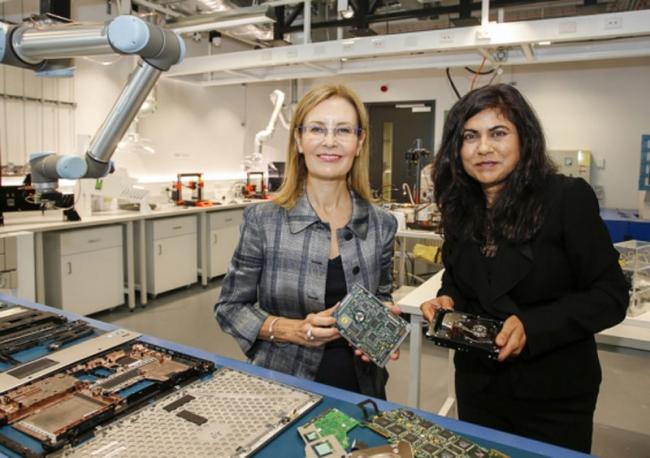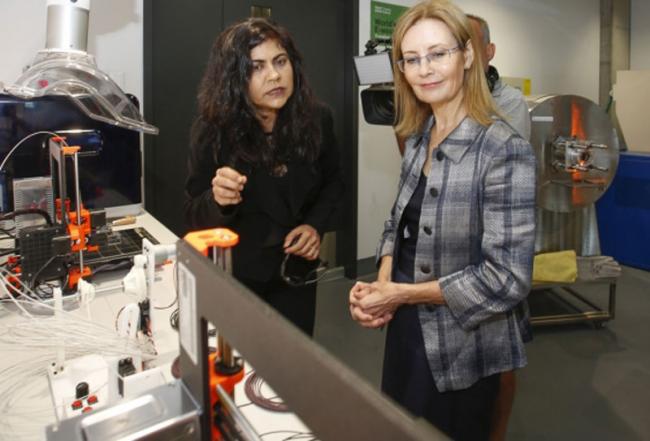
IIT-Kanpur alumna leads in tackling e-waste hazard in Australia
Sydney: Apr 8 (IBNS): Leading from the front in tackling the growing mountains of e-waste, an IIT-trained Indo-Australian scientist at the University of New South Wales (UNSW) here helped launch the world’s first micro factory that can transform electronic waste (e-waste) like smart phones and laptops into valuable materials for re-use.
Professor Veena Sahajwalla, a materials scientist at UNSW and Director of the Centre for Sustainable Materials Research and Technology (SMaRT) at the Sydney-based varsity, said the e-waste micro factory is the first of a series under development and in testing at UNSW.
These micro factories can also turn many types of consumer waste such as glass, plastic and timber into commercial materials and products.
Using technology developed after extensive scientific research at the SMaRT Centre, the e-waste micro factory has the potential to reduce the rapidly growing problem of vast amounts of electronic waste that cause environmental harm and go into landfills. The micro factory was launched at the SMaRT Centre laboratories last week.
According to Sahajwalla, micro factories present a solution to burning and burying of waste items that contain materials that can be transformed into value-added substances and products to meet existing and new industry and consumer demands.
The micro factories can use e-waste like computer circuit boards to make valuable metal alloys such as copper and tin, while glass and plastic from e-devices can be converted into micro materials used in industrial grade ceramics and plastic filaments for 3D printing.
“Our e-waste - and another under development for other consumer waste types - offer a cost effective solution to one of the greatest environmental challenges of our age, while delivering new job opportunities to our cities but importantly to our rural and regional areas, too,” the Mumbai-born Sahajwalla, who did her B.Tech in metallurgical engineering from IIT Kanpur in 1986, said.
In 2005, she invented a process known as ‘green steel’, which uses recycled plastics and rubber tyres in steelmaking, replacing coke and coal in electric arc steel furnaces.
 Her green steel technology was named in the 2012 list of Innovations that could change the way we manufacture by the US Society for Manufacturing Engineers. The technology is thought to have diverted over two million rubber tyres from landfill since 2009.
Her green steel technology was named in the 2012 list of Innovations that could change the way we manufacture by the US Society for Manufacturing Engineers. The technology is thought to have diverted over two million rubber tyres from landfill since 2009.
Sahajwalla terms micro factories a “truly sustainable solution to our growing waste problem while offering economic benefits available to local communities”.
“We have proven you can transform just about anything at the micro-level and transform waste streams into value-added products. For example, instead of looking at plastics as just a nuisance, we’ve shown scientifically that you can generate materials from that waste stream to create smart filaments for 3D printing,” she said.
“These micro factories can transform the manufacturing landscape, especially in remote locations where typically the logistics of having waste transported or processed are prohibitively expensive. This is especially beneficial for the island markets and the remote and regional regions of the country.”
These micro factories can operate on a site as small as 50 square metres and can be located wherever waste may be stockpiled.
UNSW has developed the technology with support from the Australian Research Council and is now in partnership with a number of businesses and organisations including e-waste recycler TES, mining manufacturer Moly-Cop, and Dresden which makes spectacles.
Located in Australia’s student city Sydney, UNSW is one of the world's leading research and teaching universities and is home to more than 52,000 students from nearly 130 countries. UNSW is ranked 45th in the world, according to QS World University ranking.
Sahajwalla has received numerous awards, including Distinguished Alumnus Award by the Indian Institute of Technology Kanpur for her outstanding contributions in the field of materials processing for sustainable development (2015), and also the Eureka Prize (2005), Pravasi Bhartiya Samman for outstanding achievement in science (2011).
Support Our Journalism
We cannot do without you.. your contribution supports unbiased journalism
IBNS is not driven by any ism- not wokeism, not racism, not skewed secularism, not hyper right-wing or left liberal ideals, nor by any hardline religious beliefs or hyper nationalism. We want to serve you good old objective news, as they are. We do not judge or preach. We let people decide for themselves. We only try to present factual and well-sourced news.







